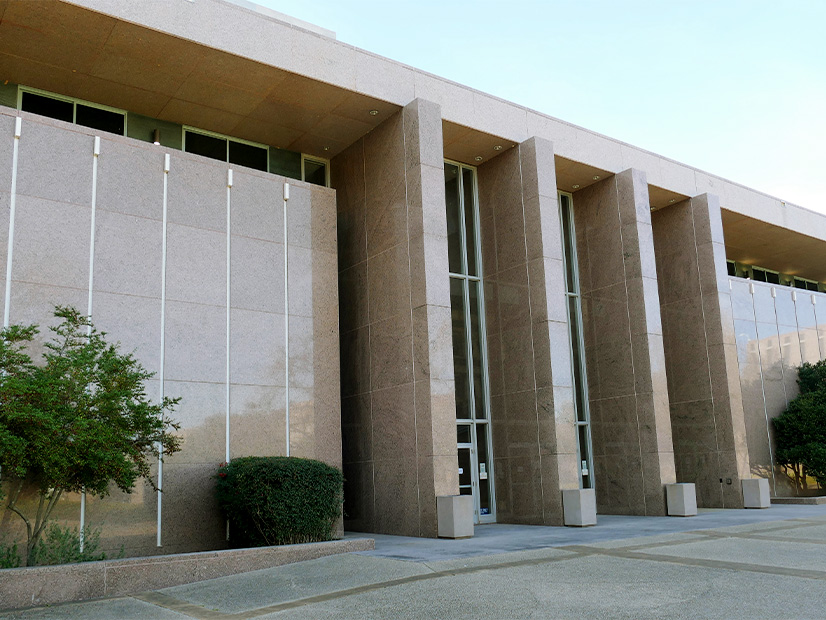
The Texas Supreme Court on Friday narrowly affirmed ERCOT’s sovereign immunity, granting it protection against fraud claims and allegations of overpricing, and asserted the Public Utility Commission’s jurisdiction over the grid operator in a pair of rulings.
The Texas Supreme Court on Friday narrowly affirmed ERCOT’s sovereign immunity, granting it protection against fraud claims and allegations of overpricing during the 2021 winter storm, and asserted the Public Utility Commission’s jurisdiction over the grid operator in a pair of rulings.
In a 5-4 decision, the state’s high court found that ERCOT is a governmental entity and immune to lawsuits because “it prevents the disruption of key governmental services, protects public funds and respects separation of powers principles.”
The majority held that the ISO is entitled to sovereign immunity because the state’s Public Utility Regulatory Act “‘evinces clear legislative intent’ to vest it with the “‘nature, purposes and powers’ of an ‘arm of the [s]tate government’” and because doing so satisfies the ‘political, pecuniary and pragmatic policies underlying our immunity doctrines’” (22-0056, 22-0196).
Writing for the majority, Chief Justice Nathan Hecht said ERCOT is a “unique entity” and provides an “essential governmental service.” He said ERCOT operates under the PUC’s direct control and oversight, it performs the “governmental function of utilities regulation, and it possesses the power to adopt and enforce rules pursuant to that role.”
“ERCOT’s governmental nature is demonstrated most prominently by the level of control and authority the state exercises over it and its accountability to the state,” Hecht wrote. “In this regard, it is much like a state agency … the state has complete authority over everything ERCOT does to perform its statutory functions.”
In a 53-page dissent that outnumbered the 40-page decision, justices Jeffrey Boyd and John Devine wrote that “the public’s trust is undermined when the judiciary extends sovereign immunity, contrary to history and tradition, to what is undeniably not sovereign: purely private entities.” They called on Texas lawmakers to correct the court’s “mistake” and waive the grid operator’s “newfound immunity” so injured parties have the right “to claim the protection of the laws.”
Thousands of wrongful death and property damage lawsuits stemming from Winter Storm Uri have been combined in pending multidistrict litigation in a district court, where ERCOT is a defendant in most of the cases.
“The root justification for possibly protecting private entities with the [s]overeign’s immunity is that, by statute or contract, they act as arms of the state: the government acted through the entity and the actions are effectively attributed to the government as ‘action taken by the government,’” Boyd and Devine wrote. “Unlike any other entity previously granted immunity by this [c]ourt, no statute designates ERCOT as a part of the government.”
ERCOT said in an emailed statement that it was pleased with the decision.
“The [c]ourt’s careful consideration of these significant legal issues allows us to continue to focus on our core [s]tate responsibilities on ensuring a reliable grid for Texans,” the grid operator said.
The PUC responded that it would “let the ruling speak for itself.”
The decision resolves two separate proceedings the Supreme Court heard in January. (See ERCOT Claims Immunity Before Texas Supreme Court.)
The high court affirmed a 2021 appeals court ruling that ERCOT is a “governmental unit” in a lawsuit brought by San Antonio municipality CPS Energy. The utility alleged that it was short-changed $18 million during the winter storm by ERCOT’s mishandling of power pricing.
It also reversed an appeals court’s judgment that the ISO is a private, membership-based nonprofit, not created or chartered by the state, in a case involving Panda Power that dates to last decade. The developer said ERCOT knowingly produced false market data in 2011 and 2012 reports that led Panda to build three power plants, a $2.2 billion investment that failed to meet its expectations.



